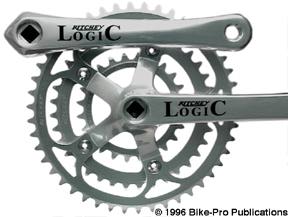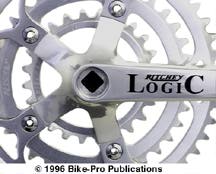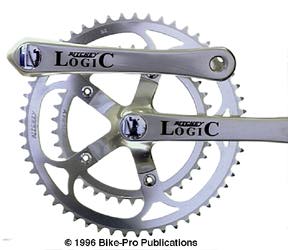



Tom Ritchey has reworked the mountain crankset to reduce weight and increase strength in needed areas. The Logic crankset is made in Japan by Sugino (who also makes the cranks sold under the Specialized name), following Ritchey's specifications. The crank arms are among the first of Sugino's new cold forged products. Cold forging again is the process of squeezing within a die form aluminum into a shape, then annealing (cooling it), then squeezing it again and annealing it until after the use of several dies it assumes the desired shape. After the arms are cold forged out of aluminum alloy, they are drilled for crank dust caps, fixing bolts, pedal and B/B spindle. The B/B spindle hole is broached to give the needed square sided, 2 degree taper. The dust cap hole is tapped with 22mm x 1mm threads, the pedal spindle holes are tapped with 9/16" by 20 TPI threads. Each of the arms is high polished by hand on the outer face, top and bottom sides, (the rear of the arm is lightly polished, the rear of the spider isn't at all) then clear (Silver) anodized. The arms have a flat surface for the face, top and bottom, making stress fractures easy to spot.
To reduce weight, one of the five arms on the spider section of the right crank arm, has been eliminated. Notice how most other cranksets have five? The fifth arm on the Ritchey crank, actually exists on the back side of the crank arm itself, where the spider, and the arm meet, (this is a style borrowed from the Campagnolo C-Record crankset, now used on the Campy Record and Record OR). This eliminates a slight amount of aluminum weight though the steel bolt and nut (fixing bolt) to hold in place are still needed and used. The crankset was designed with a low Q-factor as an objective. These Mountain cranks are said to have a 151mm Q factor, which is the distance from outer crank facing to outer crank facing with the two arms properly and securely fastened to a B/B spindle. (How well seated and tightened the arms are seems to make a serious impact on this measurement) The end of each arm, at the pedal end has the backside rounded slightly, to provide greater chainstay clearance. The left arm is forged with a point, leaving extra mass around the B/B spindle. This extra aluminum helps displace stress on an area historically prone to stress fractures.
Included with the cranks are chrome plated steel crank bolts that have affixed chrome dust caps. These bolts are similar to the "capless" design used by Shimano and have an 8mm hex fitting for removal and installation. A steel washer is included for the cap/bolt to turn against reducing friction. The bolt weighs 16.5 grams, the washer another 2.5 grams. Using a crank arm pulling tool (Park CCP1) will still be necessary to remove the arm without damage. The crankset comes with Silver anodized aluminum chainrings, and all necessary fixing bolts.
The outer chainring is die-cut from 3.66mm thick aluminum plate, then turned on a lathe to taper the teeth, and then the teeth area to 2.06mm thickness. The outer chainring has an anti-jam pin pressed into it at the crank arm, to prevent the chain from bunching up between the arm and rings in an overshift. The middle is die cut from 3.30mm aluminum plate, turned on a lathe to taper the teeth and thickness to 2.03mm. The inner made the same as the middle. The chainrings use the standard 74mm and 110mm fixing bolt pattern. Because the "fifth arm" of the spider is really the crank arm, standard outer chainring replacements with an anti-jam pin won't have the pin usefully line up correctly on the Logic Crank. Replacement with a "Ritchey" or a 110mm BCD outer designed for fifth arm cranks will be necessary to maintain the anti-jam pin functionality. The Logic Mountain cranks come with nickel plated steel middle outer fixing bolts and nuts. The inner set of fixing bolts is also nickel plated steel.
The cranks will work with any 2 degree, tapered spindle, bottom bracket. We found the Logic Mountain cranks had a Bike-Pro Q measurement of 145mm. Ritchey Logic cranks are made in 170mm, 172.5mm, 175mm, 177.5mm, or 180mm lengths with the 24-36-46 tooth chainrings. Logic cranks come as right arm, left arm, three chainrings, all the required fixing bolts, and a set of crank cap/bolts. Logic 175mm cranks with all included parts, weigh 714 grams. The steel crank arm cap set weighs 38.5 grams a pair. When ordering specify length.
Length-70-72-75-77-80 $ Price in Catalog


A set of compact cranks is in the future for the majority of mountain bike riders. Since Suntour introduced them in the 1991. Their benefit in reduced weight, stiffness in chainring, faster shifting, and the chainstay clearance of the smaller diameter outer have been obvious. Ritchey couldn't ignore the trend for long and the Compact Logic cranks are the result. The Logic Compact uses the Shimano compact bolt pattern of 94mm for the bolt center diameter for the middle and outer chainrings, and 58mm for the inner chainring. The cranks are, again, manufactured by Sugino in Japan for Ritchey. The arms are cold forged of aluminum alloy with flat a face and sides making defects and damage from wrecks easy to spot. The cold forging process makes consistently stronger aluminum forgings so these cranks have an added strength advantage. After the initial forging, which gives the arm its shape and the 2 degree tapered interior for the B/B spindle, the holes are drilled for the dust cap, fixing bolts and pedal spindle. As an added step to make the hidden fifth arm, a saw cut is made to the back side of the right arm so that an 8.5mm kerf left afterward allows access for fifth fixing bolt.
The dust cap hole is tapped with 22mm x 1mm threads and the pedal spindles are tapped with the 9/16" x 20 TPI threads. The arms are given a fine hand polish on the face and sides, (the back of the arms is left relatively untouched), then the arm is clear silver) anodized. The chainrings used for the middle and outer are the "SuperShift" variety, which employ particular bends of the chainring plate and cuts to the rear or the teeth to assist in quick shifting and chain engagement from the inner and middle chainrings. The outer chainring is die-cut from 2.65mm thick plate aluminum. The cutting process adds some bends, as corrugation to the chainring giving it added rigidity. Once die-cut, the chainring is turned on a lathe to reduce the material thickness of the teeth area to 2.0mm and taper the front and back of the teeth. The outer has an aluminum anti-jam pin driven into it.
The middle is die-cut from 2.67mm thick plate andturned on a lathe to reduce the thickness at the teeth to 2.0mm. The middle chainring has even added more bends and corrugation, with special cuts to the rear of the teeth to facilitate chain rise from the inner and delivery to the outer chainring. Both the outer and middle have been anodized in a pinkish Grey (metallic salmon) that might be referred to as WCS. The inner chainring is made of stainless steel. The mid/outer fixing bolts and nuts are made of nickel plated steel as are the inner bolt set. The Logic Compact cranks come with a set of crank bolts that are copies of the Shimano capless design. These are made of plated steel with an 8mm hex fitting for their installation or removal. Each bolt comes with a Black snap-around dust cap. Together, the bolt and cap have a 13 gram weight, you will still require a crank arm pulling tool to remove the aluminum arm without damaging it. We found the Logic Compacts had a Bike-Pro Q measurement of 154mm. The Compact is available in 170mm, 172.5mm, 175mm, 177.5mm or 180mm, with a choice of 22-32-42 or 22-32-44 tooth chainrings. The weight of a set of Logic Compacts in the 175mm length was 667 grams.
Length 70-72-75-77-80 - Rings 22-32-42=2/22-32-44=4 $ Price in Catalog

What made you think Tom would leave Road cranks alone? Small changes in the spider and its drilling lead to another iteration of this successful crank. The arms are again cold forged and use all the same techniques described in the previous two models. The spider arms are slightly longer to use the 130mm bolt center diameter. Logic Roads come with to aluminum chainrings. The outer is die-cut from 3.57mm thick aluminum plate, that is turned on lathe to machine the tooth area to a 2.11mm thickness and taper the front and backs of the teeth. The outer chainring has an aluminum anti-jam pin driven into it. The inner is die-cut from 3.57mm thick aluminum plate, turned to 2.06mm thickness at the tooth area and to taper the teeth to the needed point. A set of five nickel plated fixing bolts have 5 mm hex fittings for removal are used to secure the chainrings. Chrome plated, press- in, plastic arm dust caps are included, crank bolts are not. We found the Ritchey Logic Road cranks had a Bike-Pro Q measurement of 142mm. The Logic Road is available in 170mm, 172.5mm 175mm, 177.5mm or 180mm, with 39-53 or 42-52 chainrings. The weight of a 172.5mm set of Logic Roads is 652 grams.
Length-70-72-75-77-80 - Rings 39-52=3 42-52=2 $ Price in Catalog
The Logic Tandem cranks are a variation on the Logic Mountain cranks. This is a highly specialized crankset that has a number of unique threads on what appear to be common crank parts. First lets define terms, the person who rides on the front seat of a tandem bicycle is known as the "captain." The person on the rear seat is known as the "stoker." There are, in fact, two cranks in a tandem crankset, a front "captain's" crank and a rear "stoker's" crank. The captain's cranks are made of a right hand non-drive arm and a left arm that have a "middle" sized chainring. The captain's right arm looks like a normal left arm but (think about it) it has threads for a right hand pedal spindle. This is a particular and unique arm. The left crank arm is a drive arm, in the Ritchey case they have modified an original triple drive arm by milling away the inner triple bolt hole mountings before they were ever drilled and tapped. This left hand drive arm has a 38 tooth aluminum chainring bolted with five fixing bolts to the outer position of the arm. This left drive arm has the pedal threads tapped for a left hand pedal spindle, again unique. The stoker has a left arm that is exactly the same as the captain's, with the same 38 tooth middle bolted to the same modified arm.
The same size chainring is a must to achieve a one-to-one pedal revolution and cadence. The stoker right crank arm is a drive arm with triple chainrings in sizes that approximate a Road crankset with an added small inner chainring to establish a very low gear for the two riders to be able to hill climb. The captain adds power to the front left crank arm that drives a chain on his left side back to the left hand arm of the stoker's cranks. The stoker's right hand drive arm receives power from the captain via its left arm, and adds to it the stoker's own efforts as it drives a chain on the right hand side of the bike around the rear hub's gearing.
The front derailleur, though controlled by the captain, is on the seat tube beneath the stoker. As mentioned the Ritchey Tandem set uses a 38 tooth aluminum chainring on both left arms. The stoker's right arm has 26-36-54 tooth gearing. Each of the three drive arms uses nickel plated steel fixing bolts and nuts. The stoker's inner chainring is held by nickel plated steel inner bolts. The Tandem set comes with four Chrome plastic press-in dust caps, (but no crank bolts). With tandem cranks, all four crank arms come in the same length. The Ritchey Tandem set is available in either a 170mm or a 175mm length. The chainring's have a standard mountain bike bolt pattern using 74mm BCD for the inner and 110mm for the middle and outer. We found the stoker's cranks had a Bike-Pro Q measurement of 145mm, and the captain's had a Bike-Pro Q measurement of 144mm. The weight of the complete Ritchey Tandem crankset in the 170mm length is 1363 grams. Tandem cranks are the perfect application for a 60 tooth chainring.
Length-70-75 / T $ Price in Catalog